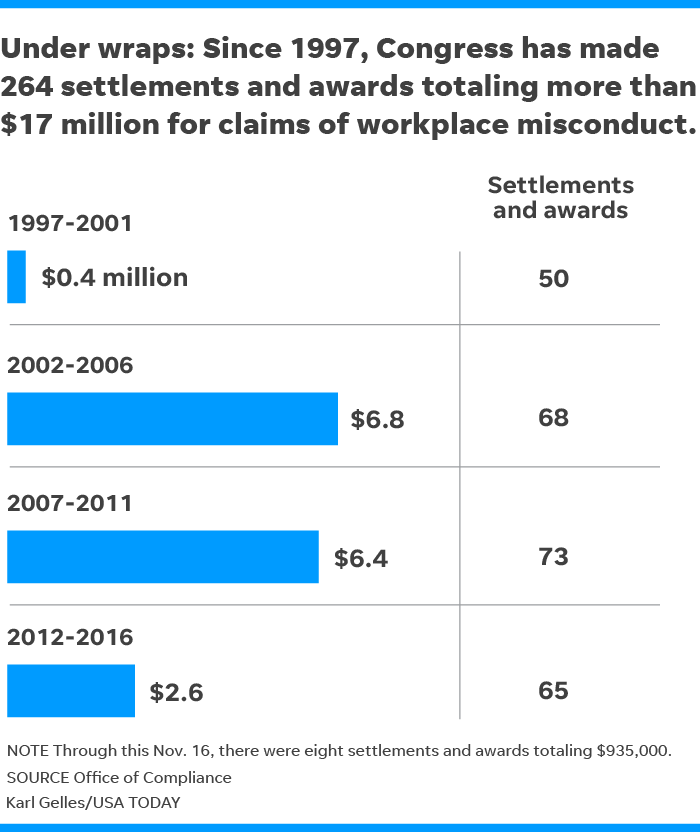When Did The Congress Bill For Hush Money Fund Start

When sexual harassers concord on confidential settlements with victims, at to the lowest degree the payments come out of the harassers' own pockets or from companies that choose to utilize them.
Simply not, as the nation has learned this month, when the harasser serves in Congress. So, taxpayers foot the bill. And the entire episode remains subconscious.
This outrageous system grows out of a 1995 law, known as the Congressional Accountability Human action, that was intended to make lawmakers subject to the aforementioned workplace laws confronting harassment and discrimination as the residue of American employers.
The law was a well-intentioned and much needed endeavor to end Congress' condition every bit the "last plantation." But some of the fine-impress provisions — such as mandating that settlements be secret and having taxpayers pick upwardly the tab for lawmakers violating the police force — correspond the opposite of accountability.
OTHER VIEWS:Coverup culture in Congress
For complainants, the human action set up an arrangement so cumbersome that it seems designed less to protect wronged workers than to insulate lawmakers from public embarrassment.
To file a complaint, employees must go through a xc-day "mandatory dispute resolution process," the commencement step of which is counseling — for the accuser. Yes, y'all read that correctly. The alleged harasser isn't forced to get counseling. The victim is.
Outside Congress, workers with claims tin can file a lawsuit in federal court whenever they desire. But if they work for Congress, "failure to follow these procedures … may jeopardize whatsoever claims raised under" the police force.
Considering of public furor over sexual harassment and the decision by some female person lawmakers to reveal their own experiences, the 1995 law is under a much deserved spotlight. In contempo weeks, current and one-time congresswomen take revealed enduring everything from unwanted advances to being groped on the House floor. One told of a staffer who quit after a lawmaker told her to bring materials to his house, answered the door in a towel, and exposed himself.
Add together to that accusations against 2 of Congress' most liberal members, and you have the makings of a watershed moment. Sen. Al Franken, D-Minn., apologized Monday for disrespecting women. Rep. John Conyers, D-Mich., stepped aside Sunday as the ranking member of the House Judiciary Committee after beingness accused of making unwanted advances toward female staffers and firing one after she resisted. (Conyers allegedly settled that claim with $27,000 of taxpayers' money from his office account, disguising it as "severance pay." He acknowledged settling only denied the allegations.)
Even so, all the public knows is that since 1997, Congress has paid more than than $17 one thousand thousand to settle scores of workplace claims from a special Treasury Department fund created past the 1995 police force.
Whether the claims involved sexual harassment, or discrimination against protected groups, is unknown. And so is the identity of lawmakers and aides involved in declared misbehavior.
Such secrecy is a betrayal of the public trust and the whole notion that government works in public. Nor should Capitol Loma be a place that tolerates crude and ugly mistreatment of women.
A bipartisan group of lawmakers, led by Rep. Jackie Speier, D-Calif., and Sen. Kirsten Gillibrand, D-N.Y., is pushing a measure to brand the complaint procedure less cumbersome for workers, get rid of required secrecy, and mandate that any lawmaker who settles a merits as a harasser repay the U.S. Treasury out of his or her own pocket.
Zippo in the Speier-Gillibrand proposal should be especially controversial, but passage is far from assured. Congress has never been peculiarly good at policing itself.
If you lot tin't meet this reader poll, please refresh your page.

Source: https://www.usatoday.com/story/opinion/2017/11/27/sexual-harassment-fund-exposes-congress-editorials-debates/898008001/
Posted by: norcrosswitilen.blogspot.com

0 Response to "When Did The Congress Bill For Hush Money Fund Start"
Post a Comment